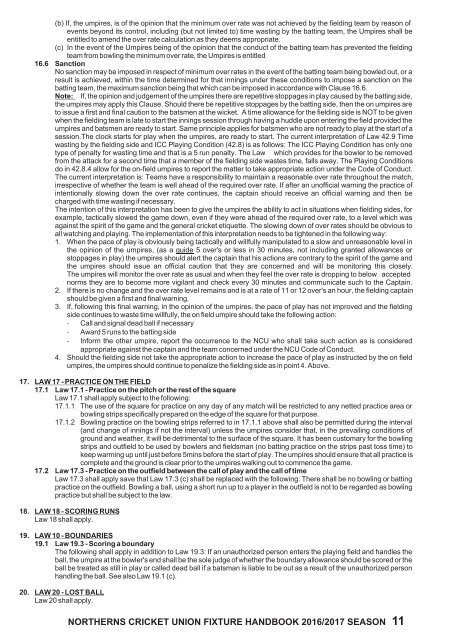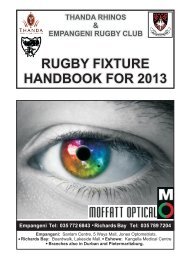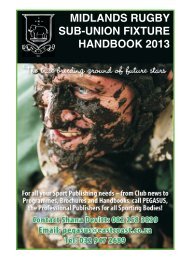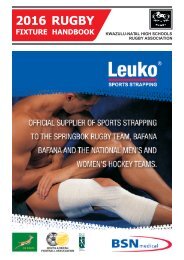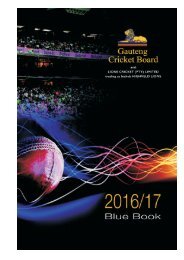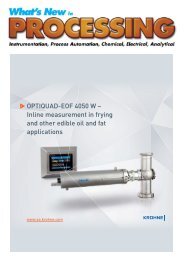Create successful ePaper yourself
Turn your PDF publications into a flip-book with our unique Google optimized e-Paper software.
(b) If, the umpires, is of the opinion that the minimum over rate was not achieved by the fielding team by reason of<br />
events beyond its control, including (but not limited to) time wasting by the batting team, the Umpires shall be<br />
entitled to amend the over rate calculation as they deems appropriate.<br />
(c) In the event of the Umpires being of the opinion that the conduct of the batting team has prevented the fielding<br />
team from bowling the minimum over rate, the Umpires is entitled<br />
16.6 Sanction<br />
No sanction may be imposed in respect of minimum over rates in the event of the batting team being bowled out, or a<br />
result is achieved, within the time determined for that innings under these conditions to impose a sanction on the<br />
batting team, the maximum sanction being that which can be imposed in accordance with Clause 16.6.<br />
Note: If, the opinion and judgement of the umpires there are repetitive stoppages in play caused by the batting side,<br />
the umpires may apply this Clause. Should there be repetitive stoppages by the batting side, then the on umpires are<br />
to issue a first and final caution to the batsmen at the wicket. A time allowance for the fielding side is NOT to be given<br />
when the fielding team is late to start the innings session through having a huddle upon entering the field provided the<br />
umpires and batsmen are ready to start. Same principle applies for batsmen who are not ready to play at the start of a<br />
session.The clock starts for play when the umpires, are ready to start. The current interpretation of Law 42.9 Time<br />
wasting by the fielding side and ICC Playing Condition (42.8) is as follows: The ICC Playing Condition has only one<br />
type of penalty for wasting time and that is a 5 run penalty. The Law which provides for the bowler to be removed<br />
from the attack for a second time that a member of the fielding side wastes time, falls away. The Playing Conditions<br />
do in 42.8.4 allow for the on-field umpires to report the matter to take appropriate action under the Code of Conduct.<br />
The current interpretation is: Teams have a responsibility to maintain a reasonable over rate throughout the match,<br />
irrespective of whether the team is well ahead of the required over rate. If after an unofficial warning the practice of<br />
intentionally slowing down the over rate continues, the captain should receive an official warning and then be<br />
charged with time wasting if necessary.<br />
The intention of this interpretation has been to give the umpires the ability to act in situations when fielding sides, for<br />
example, tactically slowed the game down, even if they were ahead of the required over rate, to a level which was<br />
against the spirit of the game and the general cricket etiquette. The slowing down of over rates should be obvious to<br />
all watching and playing. The implementation of this interpretation needs to be tightened in the following way:<br />
1. When the pace of play is obviously being tactically and willfully manipulated to a slow and unreasonable level in<br />
the opinion of the umpires, (as a guide 5 over's or less in 30 minutes, not including granted allowances or<br />
stoppages in play) the umpires should alert the captain that his actions are contrary to the spirit of the game and<br />
the umpires should issue an official caution that they are concerned and will be monitoring this closely.<br />
The umpires will monitor the over rate as usual and when they feel the over rate is dropping to below accepted<br />
norms they are to become more vigilant and check every 30 minutes and communicate such to the Captain.<br />
2. If there is no change and the over rate level remains and is at a rate of 11 or 12 over's an hour, the fielding captain<br />
should be given a first and final warning.<br />
3. If, following this final warning, in the opinion of the umpires, the pace of play has not improved and the fielding<br />
side continues to waste time willfully, the on field umpire should take the following action:<br />
- Call and signal dead ball if necessary<br />
- Award 5 runs to the batting side<br />
- Inform the other umpire, report the occurrence to the NCU who shall take such action as is considered<br />
appropriate against the captain and the team concerned under the NCU Code of Conduct.<br />
4. Should the fielding side not take the appropriate action to increase the pace of play as instructed by the on field<br />
umpires, the umpires should continue to penalize the fielding side as in point 4. Above.<br />
17. LAW 17 - PRACTICE ON THE FIELD<br />
17.1 Law 17.1 - Practice on the pitch or the rest of the square<br />
Law 17.1 shall apply subject to the following:<br />
17.1.1 The use of the square for practice on any day of any match will be restricted to any netted practice area or<br />
bowling strips specifically prepared on the edge of the square for that purpose.<br />
17.1.2 Bowling practice on the bowling strips referred to in 17.1.1 above shall also be permitted during the interval<br />
(and change of innings if not the interval) unless the umpires consider that, in the prevailing conditions of<br />
ground and weather, it will be detrimental to the surface of the square. It has been customary for the bowling<br />
strips and outfield to be used by bowlers and fieldsman (no batting practice on the strips past toss time) to<br />
keep warming up until just before 5mins before the start of play. The umpires should ensure that all practice is<br />
complete and the ground is clear prior to the umpires walking out to commence the game.<br />
17.2 Law 17.3 - Practice on the outfield between the call of play and the call of time<br />
Law 17.3 shall apply save that Law 17.3 (c) shall be replaced with the following: There shall be no bowling or batting<br />
practice on the outfield. Bowling a ball, using a short run up to a player in the outfield is not to be regarded as bowling<br />
practice but shall be subject to the law.<br />
18. LAW 18 - SCORING RUNS<br />
Law 18 shall apply.<br />
19. LAW 10 - BOUNDARIES<br />
19.1 Law 19.3 - Scoring a boundary<br />
The following shall apply in addition to Law 19.3: If an unauthorized person enters the playing field and handles the<br />
ball, the umpire at the bowler's end shall be the sole judge of whether the boundary allowance should be scored or the<br />
ball be treated as still in play or called dead ball if a batsman is liable to be out as a result of the unauthorized person<br />
handling the ball. See also Law 19.1 (c).<br />
20. LAW 20 - LOST BALL<br />
Law 20 shall apply.<br />
NORTHERNS CRICKET UNION FIXTURE HANDBOOK 2016/<strong>2017</strong> SEASON 11


